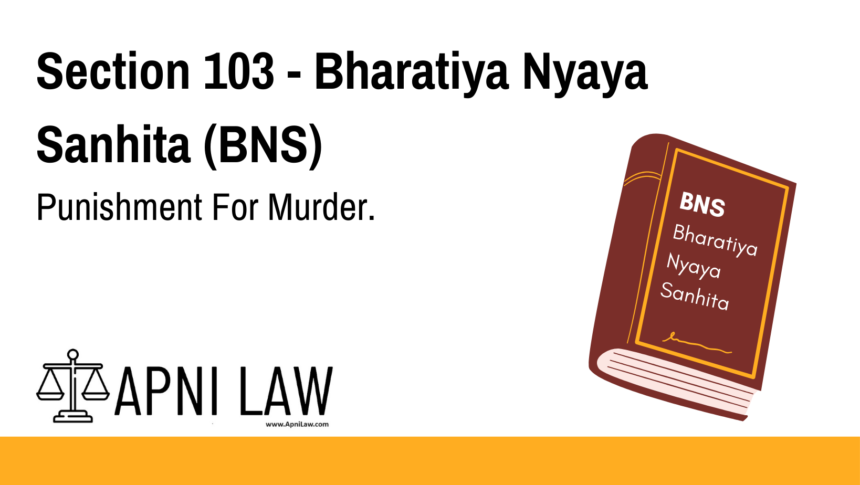Code
(1) Whoever commits murder shall be punished with death or imprisonment for
life, and shall also be liable to fine.
(2) When a group of five or more persons acting in concert commits murder on the
ground of race, caste or community, sex, place of birth, language, personal belief or any
other similar ground each member of such group shall be punished with death or with
imprisonment for life, and shall also be liable to fine.
Explanation of Section 103 BNS
Section 103 of the Bharatiya Nyaya Sanhita (BNS), 2023 lays down the punishment for murder, one of the most serious offenses in Indian criminal law. This section imposes strict penalties on individuals and groups committing murder, ensuring justice and deterrence.
Key Provisions:
- Severe Punishment for Murder
- Any individual committing murder shall be punished with either:
- Death penalty, or
- Life imprisonment, and
- Liability to pay a fine.
- Any individual committing murder shall be punished with either:
- Punishment for Group-Based Murders (Mob Lynching)
- If five or more people act together to commit murder on discriminatory grounds such as:
- Race, caste, or community
- Sex, place of birth, or language
- Personal belief or any other similar basis
- Then each member of the group will face the same punishment as an individual offender.
- If five or more people act together to commit murder on discriminatory grounds such as:
- Intent Behind the Law
- The provision is designed to deter hate crimes, mob lynching, and group violence, ensuring stringent action against organized murders based on discrimination.
Illustrations
Example 1: Individual Murder Case
A person intentionally kills another due to personal enmity. Upon conviction under Section 103(1) BNS, the court may sentence the accused to either death or life imprisonment, along with a fine.
Example 2: Mob Lynching Case
A mob of six individuals kills a man due to his religion. Since the murder was committed as a hate crime, all six individuals will face death penalty or life imprisonment under Section 103(2) BNS.
Example 3: Murder on the Basis of Language
A group of people kills a migrant worker because he speaks a different language. This falls under mob murder on discriminatory grounds, leading to strict punishment under Section 103(2).
Common Questions and Answers on Section 103 BNS
1. What is the punishment for murder under Section 103 BNS?
Murder is punishable by death or life imprisonment, along with a fine.
2. What does Section 103(2) say about group murder?
If five or more persons commit murder based on race, caste, religion, language, or similar grounds, each member will be punished with death or life imprisonment.
3. Is mob lynching covered under Section 103 BNS?
Yes, mob lynching is specifically addressed under Section 103(2) when five or more people act together on discriminatory grounds.
4. Can a person convicted under Section 103 get bail?
Since murder is a heinous offense, bail is generally not granted, except under exceptional circumstances.
5. What is the difference between Section 103(1) and 103(2)?
- Section 103(1): Applies to individual murder.
- Section 103(2): Applies to group murder (mob lynching) based on discrimination.
Conclusion
Section 103 BNS provides strict punishment for murder, ensuring justice for victims and deterrence against violent crimes. The inclusion of mob lynching provisions highlights the government’s commitment to curbing hate crimes and organized killings.
For expert legal guidance, visit ApniLaw today! 🚀








